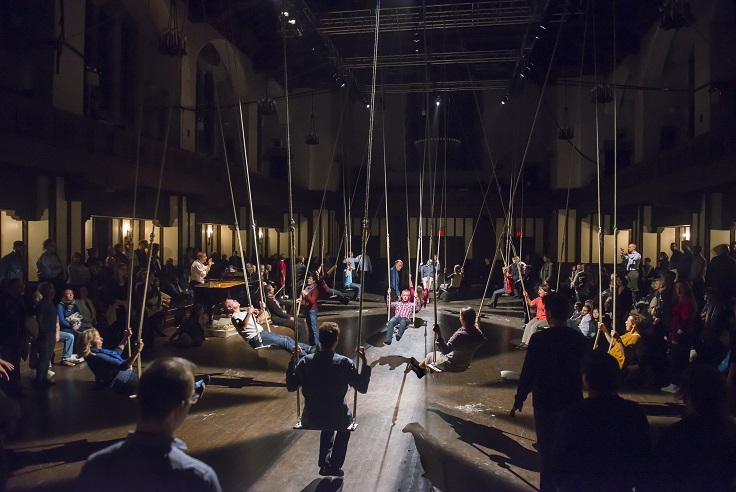 Reviewed by Ewart Shaw, Friday 16th March and Sunday 18th March 2018.
Reviewed by Ewart Shaw, Friday 16th March and Sunday 18th March 2018.
Ein Deutsches Requiem, by Johannes Brahms, is an undoubted masterpiece of Romantic choral music. Brahms chose not to use the traditional requiem text of the Roman liturgy, familiar through the Verdi. Instead, he softened, indeed removed, the message of damnation from the Requiem and replaced it with a softer, more humanist feeling. We are as grass and will be cut down, but the ransomed of the Lord shall enter Sion singing. This re-imagining of the work calls it the
human requiem, in lower case.
A traditional performance of the work, such as the Elder Hall concert mounted by the Adelaide Concert Collective on September 3rd last year, is always to be savoured. You'd think that the traditional mode of concert presentation would be the only way to present the work. Jochen Sandig and the Rundfunkchor Berlin have taken the carefully calculated risk of liberating the work from the regimented to the remarkable, mirroring the fluid vocal lines with a physical expression of individual commitment and group endeavour.
The audience, shoeless, enters the vast cavern of the Ridley Centre. Removing your shoes is supposed to enhance the experience. It doesn't. Having attended one performance and returning for a second immersion, I wasn't as surprised as some by the way the work opens, but was as moved to tears by the opening bars on the Sunday as I had been on the Friday. The choir members, indistinguishable from the milling audience, take their cue from Gis Lenaars and his assistant. Philip Mayen and Angela Gassenhuber play the piano four hands reduction of the score and suddenly your neighbour starts singing. The solos focus the experience of grief to individual voices, baritone Konrad Jarnot and soprano Christina Gansch. Gansch makes an early appearance, mute, carried through the crowd and laid out like Sleeping Beauty. Later, she begins her great aria, swinging gracefully on a swing.
Director, Sandig, in a note, thanks his partner, Sasha Waltz, for encouraging his move into directing, and his visions of each movement, as sung with such passion by the Rundfunkchor Berlin.
On both nights I met chorister friends of mine, all of us enthralled by this new vision of so familiar and well-loved a work. Adelaide choristers should learn from the choir to have their music by heart so that they can respond instantly to their conductor's beat. I'd also suggest that no Adelaide choir tries to do it themselves.
There are more than sixty voices in the Rundfunkchor (Radio Choir) Berlin, and here they become an opera chorus, singing from memory, moving through the audience, and interacting dramatically and musically with the freedom that gives them. They trust themselves.
There has been a significant amount of choral music and community engagement in both the Festival and Fringe, with a highlight for me being the almost unnoticed concert given by Estonia's E-Stuudio Youth Choir, who self-funded their trip to Australia to mark Estonia's 100th birthday. This and the growing number of community choirs in Adelaide is a sign of good things to come in the world of the singing voice.
Reader Reviews
To post a comment, you must
register and
login.
 Reviewed by Ewart Shaw, Friday 16th March and Sunday 18th March 2018.
Reviewed by Ewart Shaw, Friday 16th March and Sunday 18th March 2018. Reviewed by Ewart Shaw, Friday 16th March and Sunday 18th March 2018.
Reviewed by Ewart Shaw, Friday 16th March and Sunday 18th March 2018.